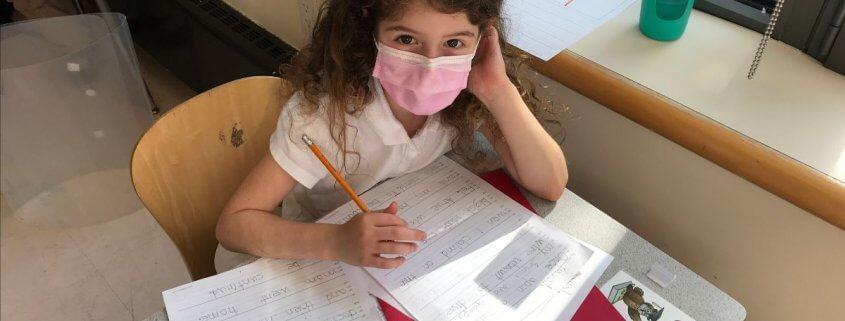Perspective Taking and Empathy: Skills for Success
Perspective Taking and Empathy: Skills for Success
Over the last few years I have asserted repeatedly that, among the many important skills we help students develop at Schechter Manhattan, perspective taking and empathy are critical for our students’ success. By perspective taking, I mean the ability to hold in one’s mind both one’s own understanding of an idea or problem and someone else’s opposing view at the same time. The emotional corollary of perspective taking is empathy, the ability to relate to someone else’s feelings. Perspective taking and empathy are both skills that require practice to hone, and dispositions that require flexible thinking and openness to others.
These skills nurture positive relationships with others. They open us to the possibility that we have things to learn from other people’s understandings and perspectives and help us relate to other people’s feelings. So that when we encounter people who are different from us, even if we have not lived the exact same experiences, we can build on our shared humanity as we attempt to understand how they feel.
Perspective taking and empathy are also central skills for successful development of a positive Jewish identity. In a time of divisive politics, vocal anti-Semitism, racial discord, and a growing divide between American Jews and Israel, there are many challenges to the development of a healthy and integrated American Jewish identity. The world of the 21st century is complicated. Young people without the skills and dispositions of perspective-taking and empathy, who cannot see and understand complex ideas and issues from multiple angles, will find themselves in black and white paradigms. This makes it hard for them to see how it all fits together and can lead to the rejection of a given part of their identity, communities and values. Young people who have these cognitive and emotional skills are able to apply them to their own identities, how they see themselves in the world, and bring together what can at times be conflicting traditions, experiences, and feelings into a meaningful whole.
I was excited to learn about another way that perspective taking and empathy promote success at a recent presentation by Valerie Purdie-Greenaway, an associate professor in the Department of Psychology at Columbia University and the director of the Laboratory of Intergroup Relations and the Social Mind. She spoke about how to lead effective teams, and she shared research about “collective intelligence”, a group’s capability to collaborate and coordinate effectively across a range of tasks, which is predictive of a group’s future performance. Professor Purdie-Greenaway pointed to psychological studies that sought to determine what characteristics make for high collective intelligence in groups. While high collective intelligence did not correlate with the intelligence of individuals in a group, as measured by IQ tests, the top characteristic of groups with high collective intelligence was their members’ capacity for perspective taking, being able to accurately attribute mental states to others. She made the case strongly: if leaders want to develop strong and effective teams, they should help their team members build their perspective taking and empathy skills.
At Schechter Manhattan we work to help students practice perspective taking and empathy every day. This starts with interpersonal interactions – with students of all ages being asked and expected to consider the ideas and feelings of their peers. Students in Schechter Manhattan classrooms work in collaboration with each other every day, and in those partnerships they learn to give and take, listen and contribute, support and challenge one another. When they disagree, Schechter Manhattan teachers help them find the tools and words to communicate effectively, hear each other, treat each other with caring and respect, and find a way forward together. In regular classroom discourse, students become enculturated to the experience of one student sharing an idea or opinion and another safely expressing the opposing perspective. The Schechter Manhattan teaching faculty takes responsibility for nurturing safe classroom communities where this sort of constructive debate can take place. These daily interactions are enhanced and supplemented through Second Step, a social-emotional learning curriculum used throughout the grades at Schechter Manhattan, that affords explicit practice of considering other’s thoughts and feelings.
This work is so important, because teaching our students these skills will help them to have kinder relationships, stronger senses of self, and be more effective collaborators in the groups they will join in their personal and professional lives.



